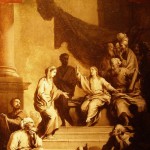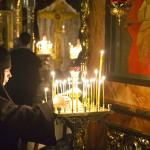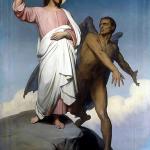(The Nicene, of course.)
Is it possible to say the creed too much? I find myself praying it at all times, singing it in my head as I go about my daily tasks.
Credo in unum Deum,
The first word of the Creed is already a bombshell: “I believe.” This is a religious revolution, so profound that it takes it for granted. The new Christian religion is not an orthopraxy, it is an orthodoxy: you are a Christian because of what you believe, not what you do or where you were born or who your parents were. And the fundamental unit of the Christian religion is the individual. To be Christian, it is the individual who must respond to the prompting of the Holy Spirit with faith. Religion is the free choice of the individual, not social superstructure. The Credo starts from the individual to rise towards God. Credo, two syllables, to light the word on fire!
“in unum Deum”: again, the radicality, in the Pagan Mediterranean world. There is a stress, here: “Deum” is already a singular, but the Fathers emphasized it, hitting the nail as far as it will go. Christians are radical monotheists. We believe in one God.
Patrem omnipoténtem,
After his existence, and his oneness, what do we learn about this God? That He is Father. Father! All Christians must make theirs the cry of Jesus, “Abba, Father!” (“Abba” is even closer to “Daddy.”) And again it is revolutionary–the Fatherhood of God makes succinct appearances in the Old Testament, but it is Jesus who makes it central. Such richness in this imagery–which is not merely imagery, but dogmatic reality. God really is Father; it is human fatherhood which is a pale image of God’s perfect fatherhood. But we can always trust in God’s perfect fatherhood.
This makes God’s omnipotence a particular kind of omnipotence, because it is a fatherly omnipotence. In the classical ontology of God as expressed by figures such as Aquinas, God is not a capricious super-alien Overlord who can do whatever he wants. He acts only in accordance with his supreme goodness. Obviously, much, much, much more could be said. I recommend The Humility of God, by Fr. Varillon, SJ.
Factórem cæli et terræ,
Visibílium ómnium et invisibílium.
I am fascinated by this line of the “visibilium omnium et invisibilium.” The concept of omnium here is key. What is referred to here is not merely “all things” but a created order. The Universe is a cathedral, properly ordered by God. And this omnium has visible and invisible aspects. Or, if you prefer, there is an entire invisibilium omnium, as “big” and important as the material Universe.
From the contemporary perspective there is a natural boldness here which is quite refreshing. Note the Fathers don’t even ask you to believe in this invisible world: they would have taken it for granted; the question at issue is who created it. Even the pagans took for granted the invisibilium omnium. I am reminded of he great lapidary phrase from the First Vatican Council: “If anyone is so bold as to assert that there exists nothing besides matter: let him be anathema.” If anyone is so bold as to be a materialist! Indeed it is boldness, folly even, although it is obscured these days.
Et in unum Dóminum Iesum Christum,
Fílium Dei Unigénitum,
Et ex Patre natum ante ómnia sæcula.
i.e. “Thanks, John, for that Gospel! Really helpful!”
What is there to say, here? Either books or falling silent before the mysterium Christi.
Deum de Deo, lumen de lúmine, Deum verum de Deo vero,
I love this verse; especially in the Missa de Angelis Gregorian version, it soars with lyrical beauty, rising and lingering on the last words. What poetry! It is striking and revealing in itself that a formal Creed voted upon by an Ecumenical Council makes room for poetry, which is what this is (yes, it’s also there to say “Nyah nyah, Arians! Take this! And this!”), which itself tells you something about the nature of Christian truth. Alliteration, rhythm, transcendent beauty, this verse has everything. Transcendent beauty.
Génitum, non factum, consubstantiálem Patri:
More Arian-bashing. Those Fathers would have loved today’s blog-fights.
Per quem ómnia facta sunt.
Qui propter nos hómines et propter nostram salútem
Descéndit de cælis.
Et incarnátus est de Spíritu Sancto
Ex María Vírgine, et homo factus est.
Even when I’m singing the Creed to myself while doing the dishes, I bend on those last words. In the ordinary form of the Mass, we bow at “homo factus est”, and in the extraordinary form, we kneel for a bit longer. This is deep wisdom. Here is the deepest mystery, here is the most central truth of the Christian faith, the one on which everything else turns: the infinitely transcendent became the infinitely near.
Crucifíxus étiam pro nobis sub Póntio Piláto;
Passus, et sepúltus est,
Et resurréxit tértia die, secúndum Scriptúras,
Et ascéndit in cælum, sedet ad déxteram Patris.
This hits perfectly at every note. Jesus was crucified sub Pontio Pilato, meaning this really happened, in historical time, under these historical circumstances. It really happened. It is a fact, and we have documentation, and we believe that this is a historical fact; we do not believe in a spiritual or conceptual Jesus, but a man who lived and breathed and walked and died and rose again.
And he rose secundum Scripturas. (Take that, Marcion.) The entire testimony of Israel leads to and through Jesus (Jn 5:39)
More poetry: there is no literal “seat” “to the right” of the Father. The Creed combines historical assertion with poetic evocation. This is the Christian way.
Et íterum ventúrus est cum glória,
Iudicáre vivos et mórtuos,
Cuius regni non erit finis.
From Sr Ruth Burrows, OCD: “He is ‘judge of the living and the dead’ not in the sense that he assumes the role of a judge appraising the conduct of our lives, but in the sense that our only value lies in our likeness to him.”
Et in Spíritum Sanctum, Dóminum et vivificántem:
Qui ex Patre Filióque procédit.
Qui cum Patre et Fílio simul adorátur et conglorificátur:
Qui locútus est per prophétas.
One reason why I like the Nicene Creed so much over the Apostles Creed is because it tells us stuff about the Holy Spirit! The great unnoticed Person of the Trinity!
The Spirit is Lord and giver of life. Put that on your business card. At least, meditate on it. Lord and giver of life! He is everywhere, and everywhere he does good. Dominum et Vivificantem, by the way, is a great encyclical by St John Paul II which I recommend. He spoke through the prophets: he is everywhere in the Bible.
(Nope, not saying anything about the Filioque thing.)
Et unam, sanctam, cathólicam et apostólicam Ecclésiam.
One of my favorite parts of the Creed. Again, the Missa de angelis version has great musicality here, and there is great poetic rhythm to the phrase.
We are saved through the Church, which is the Body of Christ and our mother, and it is beautiful. The Church is indeed necessary for salvation (which means it is a key part of the plan of salvation), it was established by Jesus Christ our Lord himself for just this purpose, with hierarchy, dogma, constitution, doctrine visible unity, sacraments, and all the rest. It is the greatest thing that by the grace of God men made.
(It also never fails to remind me of Pope Boniface VIII’s excellent bull Unam Sanctam.)
And yes, I never stop being astonished that so many Protestants believe they can say the Nicene Creed, given what it says about the nature of the Church. You can lawyer your way out of “one” and “catholic” all you want, but there is no way to understand apostolicity as anything else than what, well, the apostolic churches believe it means. Anyone who knows a bit of Church history certainly knows that this is how the authors of the Creed themselves understood it.
Confíteor unum baptísma in remissiónem peccatorum.
Et expecto resurrectionem mortuorum,
Et vitam ventúri sæculi. Amen.
The life of the centuries to come! Jesus has come that we may have life, and have it to the full! Gloria Dei homo vivens!
















